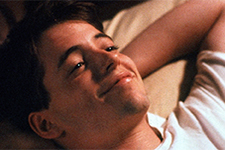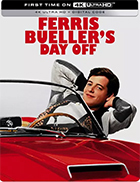Ferris Bueller's Day Off (4K UHD)
|  In the span of only three years, from 1984 to 1987, John Hughes directed and/or wrote six movies, which resulted in his becoming known as the reigning king of the Hollywood teen movie, a genre that had seen a massive resurgence in the 1980s after being largely dormant since the “teenpics” of the 1950s and ’60s (George Lucas’s American Graffiti in 1973 notwithstanding). However, unlike other filmmakers who saw the world of teenagers as an excuse to exploit the adolescent obsessions with booze, drugs, and sex, Hughes was fascinated by the complex social and emotional terrain of middle-class teenagerdom, and he treated his characters with a degree of sympathy and good-natured humor that was largely absent from a genre glutted with movies like Private Lesson (1981), Porky’s (1981), and Zapped! (1982). Beginning as a writer for National Lampoon in the 1970s, Hughes entered Hollywood as a screenwriter, scoring two hits in 1983 with the comedies Mr. Mom and National Lampoon’s Vacation. He made his directorial debut in 1984 with Sixteen Candles, an often absurdly funny, but ultimately poignant comedy about a girl whose crucial 16th birthday is ignored by her family (among other indignities). Hughes followed that film with The Breakfast Club (1985), which was one of the first serious teen dramas of the decade and probably his most influential film. He subsequently wrote and produced two other teen dramas, Pretty in Pink (1986) and Some Kind of Wonderful (1987), both of which were directed by Howard Deutch, and he also wrote and directed Weird Science (1985), the closest he ever came to making a deliberately crude teen comedy. Yet, if one had to pick the quintessential John Hughes teen movie, it would have to be Ferris Bueller’s Day Off, which was also the last teen movie he both wrote and directed. Ferris Bueller stands out for a number of reasons, particularly in the way it so perfectly evokes teenage fantasies of absolute autonomy and subversion of adult power (which, from this perspective, can only be seen as moronic and buffoonish). While his previous films had centered around misfit protagonists who didn’t fit in, the titular character in Ferris Bueller’s Day Off is the teenager all teenagers want to be: confident, secure, and so individualistically cool that he transcends the traditionally rigid boundaries of adolescent cliques (as Edie McClurg’s otherwise clueless secretary Grace famously notes in the film, “The sportos, the motorheads, geeks, sluts, bloods, wastoids, dweebies, dickheads—they all adore him. They think he’s a righteous dude”). Hughes has great fun taking the concept of teen popularity to its absurd zenith throughout the film, with the entire city of Chicago rallying around the mistaken belief that Ferris is dying, when in fact he is simply faking a stomach flu to skip school for the tenth time that semester. “Popular” characters in teen movies are traditionally the villains (possibly because it’s the nerds who end up going to Hollywood and becoming writers and directors), but Hughes pulls a coup in making the most popular kid in school also the most likable and the most sympathetic. This is largely due to the casting of Matthew Broderick, who at the time had appeared in only a handful of films, including Max Dugan Returns (1983) and War Games (1983), although he was well known for his stage roles as Neil Simon’s alter ego in Brighton Beach Memoirs and Biloxi Blues. In all of those roles Broderick had played smart and thoughtful, but somewhat awkward and unsure characters—quite the opposite of Ferris Bueller. Youthful in appearance and not conventionally handsome in the manner of most popular teens, Broderick perfectly embodied Ferris’s unrivaled individuality without being unreachable. He was, in a sense, the cool kid that any kid could potentially be or be friends with. As the title suggests, the story in Ferris Bueller’s Day Off follows Ferris as he ditches school by faking illness, a performance that his gentle, well-meaning, and utterly loving parents (Cindy Pickett and Lyman Ward) swallow hook, line, and sinker (the fact that Ferris can so blatantly manipulate his parents’ affections without coming across as a cad is a small miracle in and of itself). Ferris brings along his girlfriend Sloane (Mia Sara) and his best friend Cameron (Alan Ruck), the latter of whom is crucial to further establishing his uniqueness of character. The fact that his longtime best friend is a chronic worrier who is usually home from school because he’s literally sick due to being browbeaten by cold and distant parents contrasts and therefore accentuates Ferris’s supreme self-confidence while also showing Ferris’s loyalty to an unlikely friend. Having Sloane as a girlfriend simply cements the fantasy of Ferris having everything, which is a constant source of tension with his sister Jeanie (Jennifer Grey), whose resentment toward Ferris borders on the pathological. However, when it comes to being anti-Ferris, Jeanie has nothing on Ed Rooney (Jeffrey Jones), the school principal who knows that Ferris is making him look like a fool, but has so far failed to catch him in the act. If Ferris is the ultimate fantasy teen hero, then Rooney is the ultimate villain, the very personification of repressive adult culture and its envy of youth. With his starched suits, impeccable grooming, and shifty eyes, Rooney embodies official power, the enemy of adolescent freedom, and the primary pleasure of Ferris Bueller’s Day Off is not so much in watching Ferris and his friends get away with everything, but in watching Rooney humiliate himself (and, by proxy, all stuffy adults) while trying and failing to stop them. Re-watching the film for the first time in many years, I was struck by how often Ferris is off-screen in lieu of Rooney’s slapstick antics in trying to break into the Bueller home and thereby prove that Ferris is truant, an absurd strategy that develops into a litany of physical and personal humiliations involving mud, a garden hose, an angry Rottweiler, and a rapid-fire series of head kicks worthy of Bruce Lee. It is no surprise that Hughes has the final credits running over Rooney’s last indignity: having to ride the school bus home because his car has been towed. Perhaps because he only directed eight films in his career while writing or co-writing more than 30, Hughes has typically been undervalued as a director. However, Ferris Bueller’s Day Off provides ample evidence of his visual sophistication and willingness to experiment in a genre that typically deploys the look of a made-for-TV movie. Throughout the film Hughes plays freely with form and aesthetics, allowing Ferris to break the fourth wall and speak directly to the audience, a move that also contributes to our connection with him. The film’s editing patterns are reminiscent of music videos, which at the time were still a new and evolving form, and Hughes deploys pop music in consistently interesting ways, never more so than in his evocative use of Yello’s instantly memorable “Oh Yeah” when Ferris cajoles Cameron into allowing him to take out his father’s prized 1961 Ferrari (which is simultaneously the symbol of ultimate freedom and ultimate repression). The film is also replete with all means of vaguely surreal detours and oddball moments of humor, particularly a sequence in the Art Institute of Chicago that has literally no narrative purpose. There are, of course, also the big set pieces, such as when Ferris commandeers a float in a downtown Chicago parade and has the whole city dancing along while he belts out “Twist and Shout.” And, while those moments have their place, it is the film’s overall sense of abandon, its willingness to break convention and throw us into the fantastical, but strangely believable world of its characters, that makes Ferris Bueller not only Hughes’s best teen films, but one of the best teen films ever made.
Copyright © 2023 James Kendrick Thoughts? E-mail James Kendrick All images copyright © Paramount Home Entertainment | |||||||||||||||||||||||||||||
Overall Rating: 


 (4)
(4)


